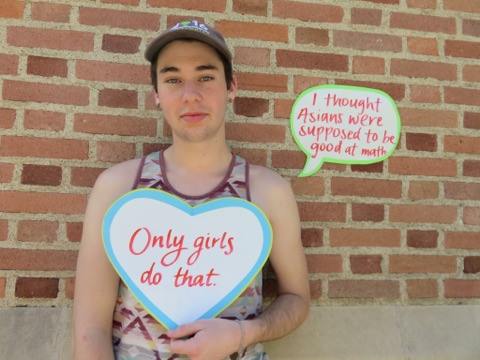Listen Up, Speak Up, Open Up

Samuel Francis. Photo by Sarah Barukh
On February 15th and 22nd, Intergroup Relations showcased their program “Open Up”, which aims to lend an ear to the too often hushed conversation regarding microaggressions. “Open Up” targeted the duality of this issue by having participants write on two white boards: one to express a microaggression that has been said to them and one to express a microaggression that they have said to someone else. Participants then stood holding each sign– one (shaped like a thought bubble) against their head and one (shaped like a heart) against their chest– as one of the organizers took their picture. The collection of photographs gathered from this program will be displayed in the Kerckhoff Art Gallery during spring quarter.
Psychology Today defines microaggressions as “everyday verbal, nonverbal, and environmental slights, snubs, or insults, whether intentional or unintentional, which communicate hostile, derogatory, or negative messages to target persons based solely upon their marginalized group membership.” On a campus as large and diverse as UCLA, where individuals coming in with a multitude of different lived experiences interact, comments such as these are certainly not hard to come by.
Regarding the importance of supporting events like “Open Up”, IGR intern and 2nd year Sociology and Psychology major Liam Farrell explained, “We had a retreat for our Intergroup Relations internship and… it made me think about the duality of…how bad microaggressions are and about how harmful they are to society. But at the same time, we have also said microaggressions ourselves, and we’ve also probably micro-aggressed people without even knowing we’re doing it.”
“UCLA specifically is a very liberal school,’ Farrell continued, ‘but it is somewhere where microaggressions aren’t really talked about. It’s kind of a topic that gets swept under the rug a lot…so I feel that bringing it to UCLA is something that is very important. It’s also all encompassing because…we could have a photo series about sexual orientation, or we could have a photo series about race, but this is a way to encompass all of those social identities into something singular and something unique.”
Microaggressions are often misinterpreted as an individual’s inclination to be overly sensitive or offended by statements that are not “politically correct.” However, comments such as these can make an individual of a marginalized group feel as though they don’t belong, whether it be in the classroom, at an extracurricular activity or in the school itself. Only by acknowledging how we have participated in the perpetuation of these microaggressions– by unintentionally saying statements that target other’s social identities and by being victims to these harmful words– can we begin to have an open conversation about their lasting effects.
In addition, it is imperative to consider the multitude of intersectionalities and complexities embedded in each individual’s social identity. There is no set list of statements that will or will not harm every person of a particular social identity, but if we aim to be aware of our words, and of other’s life experiences when we address them, we can communicate in a way that is beneficial to all involved.
Farrell explains, “I really hope to [raise] people’s level of consciousness about their own words and their own statements. I’m really hoping that people will walk away from this understanding what a microaggression is and how they can stop themselves from perpetuating the cycle… If you walk away from this thinking ‘That comment that someone said to me a year ago, that was a microaggression and I never talked to them about it or I never confronted them about it, but now a year later, it’s something that still sticks in my head and makes me feel some sort of way’, that’s a problem. Hopefully, people can walk away and really understand those microaggressions and how they can better cope with them in the future, and hopefully we can make a little dent in ending the cycle.”




